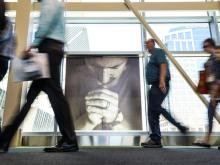Gambling

Southern Baptists, grappling with the country’s political realities, adopted a statement on the importance of public officials who display “consistent moral character.”
But, within minutes of that action at their annual meeting, they agreed with a committee’s decision not to bring forth a proposed resolution condemning the “alt-right movement,” whose members include proponents that call themselves white nationalists.

Canadian police are investigating Chaldean Catholic priest from London, Ont., after church officials reported more than $500,000 Canadian dollars ($380,000 U.S.) slated for refugee sponsorship was lost to gambling, according to The Toronto Star.
Father Amer Saka, a priest working at the St. Joseph Chaldean Catholic Church in London, allegedly told his bishop, Emanuel Shaleta, that funds intended to help new Canadians had instead vanished in vice, Shaleta told the Star.
PEOPLE GAMBLE—always have, and always will. But when the state decides to encourage this human tendency and exploit it for its own profit, then we definitely have a moral problem.
In December, the U.S. Justice Department ruled that it is permissible for states to sell lottery tickets online, making it easier for state governments to bilk their citizens. Illinois internet lottery sales were slated to begin in late March. Although the sales are limited to state residents, the greater convenience of internet buying will likely cause more people to try the lottery.
In contrast to a “sin tax” on alcohol and cigarettes, in the case of the lottery the state becomes a pusher of gambling. The government, rather than serving and protecting its people, is “the house,” committed to creating more losers to make more money.
When we follow the advertising money, we discover that the lottery has been sold primarily to the poor and those on fixed incomes: The billboards are in the inner city, not the upscale suburbs. The lottery is promoted in such places with the deceitful promise that a buyer has a good chance to win security for a lifetime.
The Illinois Lottery was started in 1974 and, since 1985, its profits have gone by law to fund public education. In a classic example of “bait and switch,” however, legislators put the lottery money into school funding—but redirected the former funds to other parts of the state budget. Public education remains a major concern in Illinois, even as the lottery has added gimmick after gimmick over the years. Today the state legislature budgets only 75 percent of what is, according to an advisory committee, the minimum acceptable spending per student; it has almost a billion dollars in unmet obligations to the schools.
The Christian Coalition of Georgia, along with Peace State Methodist and Baptist churches, are in a pitched battle to close down the state's video poker machines.
Tennessee, Hawaii, and Utah are the only states that have no legalized gambling or lotteries.
[Demi] Moore's strong flair for taking risks for jumbo-sized payouts showed up clearly when she dared to pose nude and pregnant on the cover of Vanity Fair....